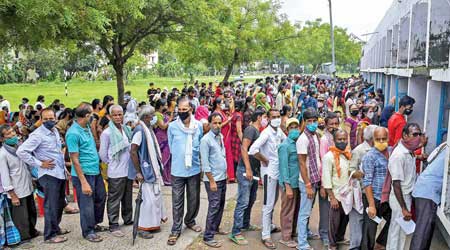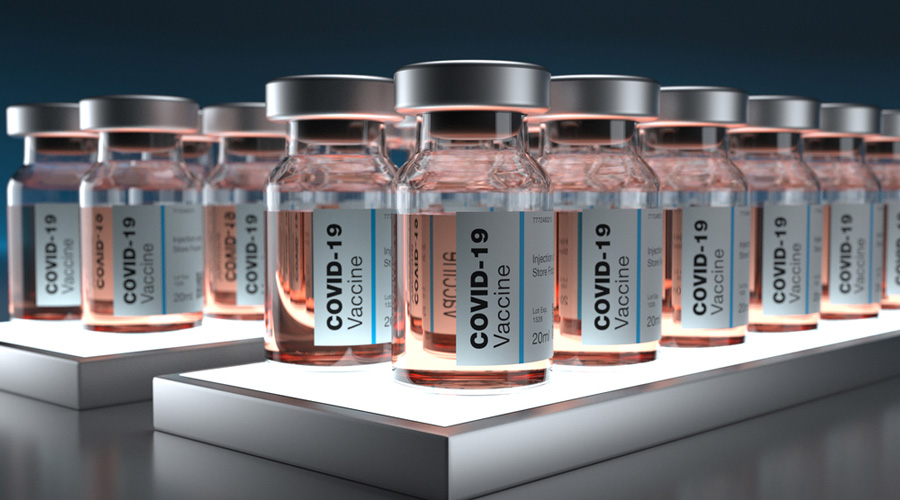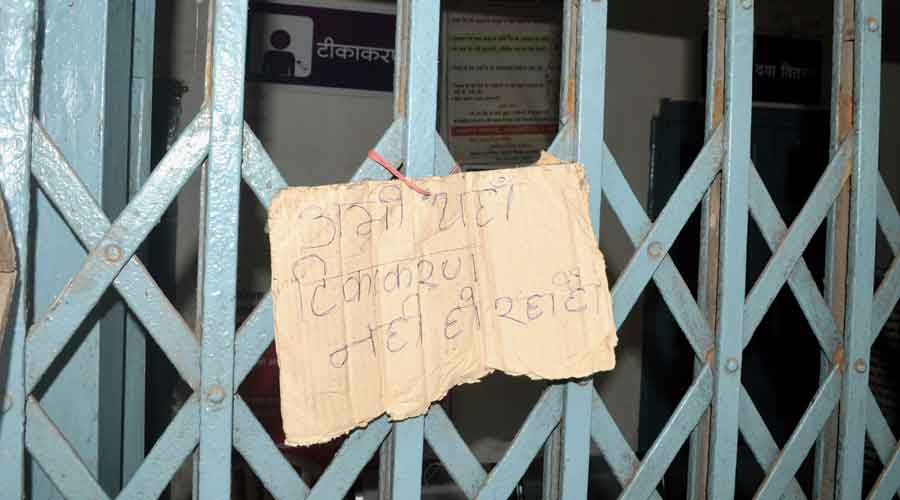The Union health ministry on Wednesday blamed the states and private hospitals for poorly managing the Covid-19 vaccination campaign amid continued complaints of vaccine shortages by some states and people being denied doses at inoculation centres.
The health ministry said many private hospitals had not requisitioned doses earmarked for them. In many cases, payments were pending on orders and, in some cases, vaccines paid for had not been “lifted” by states or private hospitals.
States have been “advised to ensure speedy and effective coordination” between private hospitals and the vaccine suppliers to remove bottlenecks, the ministry said after Union health secretary Rajesh Bhushan chaired a meeting of health officials from 15 states and vaccine suppliers.
But health experts said the Centre had flagged classical supply chain management issues that likely coexisted with the vaccine shortages in the country that the health ministry had denied but vaccinology researchers and industry executives had described as inevitable.
“There are such problems on the ground — but we need to ask whether they’re being used to cover up for supply shortages,” a public health specialist familiar with the discussions during the meeting told The Telegraph. “It is clear there are gaps between demand and supply.”
The country’s vaccination campaign has over the past two weeks administered on an average slightly lower than 4 million doses per day, although it needs to administer over 8.5 million doses daily to fully vaccinate the estimated 940 million population by the year-end.
“Irrespective of the supply chain management issues, the shortages are evident from the differences between what we need and what we’re getting,” said the public health specialist who requested not to be named.
The lack of orders from private hospitals suggests that the 25 per cent reservation for the private sector is actually slowing down the campaign, said R. Ramakumar, a professor of developmental studies at the Tata Institute of Social Sciences, Mumbai.
Under the current vaccine distribution formula, the Centre procures 75 per cent of available doses for free distribution through states and reserves 25 per cent for private hospitals where Covaxin is available for about Rs 1,250 per dose and Covishield for about Rs 780 per dose.
“The vast majority of our population cannot afford this. Two doses for a person will eat away half a month’s income for a household at the poverty line,” said Ramakumar, who has filed a petition in the Supreme Court seeking changes in the vaccination policy and 100 per cent free vaccines.
Experts tracking global vaccination orders and industry executives had earlier this year predicted India would face acute shortages in the early months of the inoculation campaign because it rapidly expanded the campaign without ensuring the availability of required doses.
Union health minister Mansukh Mandaviya on Wednesday claimed that statements on vaccine shortages and slow availability of vaccines “are not based on facts” and the number of available doses had increased to 135 million in July from 114 million in June.
Mandaviya said the Centre had provided advance information on available doses to states and appeared to blame the states for mismanagement. “If mismanagement and long queues of vaccination beneficiaries are being seen, it is clearly evident what the real issue is and who is responsible,” he tweeted.
But experts said under the current demand-supply circumstances, where exactly vaccine shortages become visible or acute would hinge on factors such as doses supplied and doses demanded, and how many people opted for specific vaccination sites.
A nationwide citizens’ survey has found that 65 per cent of people sampled from 278 districts across India knew someone in their social network who was unable to get a dose after reaching a vaccination centre over the past week.
Respondents from Delhi, Karnataka, Madhya Pradesh, Maharashtra, Odisha and Tamil Nadu were among those who knew someone — among family or friends — in their social network who was unable to get jabs, the private survey conducted by Local Circles, a community social media platform, has found.
Among 8,931 respondents, 20 per cent knew four or more people who couldn’t get a dose after reaching a vaccination centre, 26 per cent who knew two or three people and 19 per cent who knew one person.












